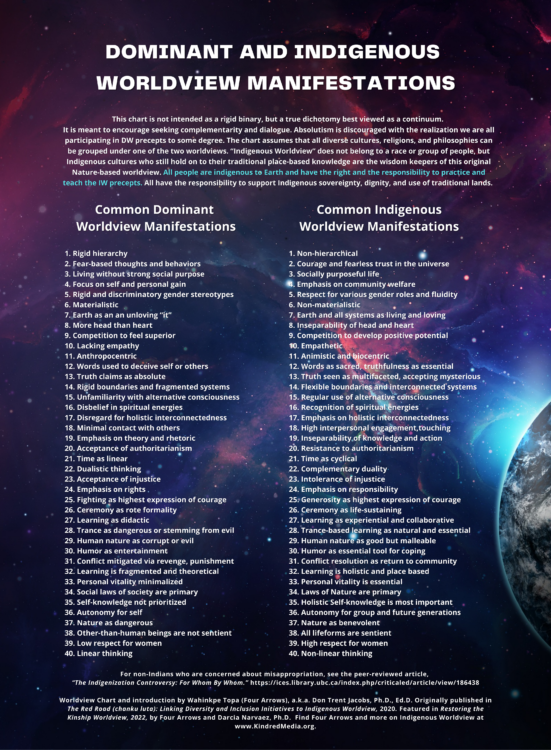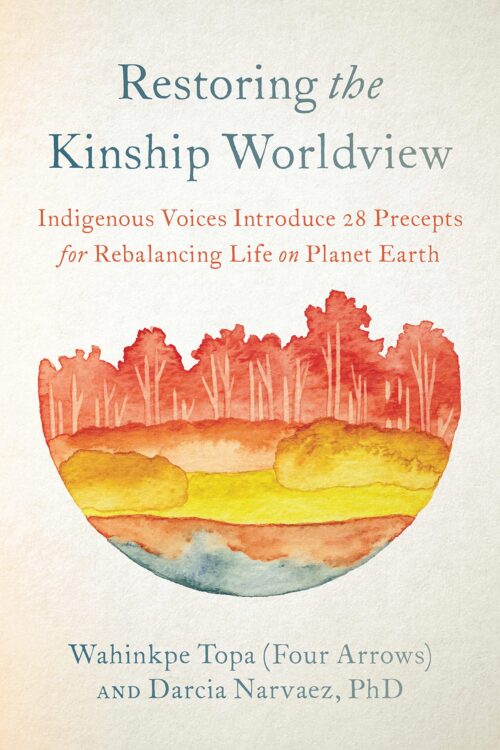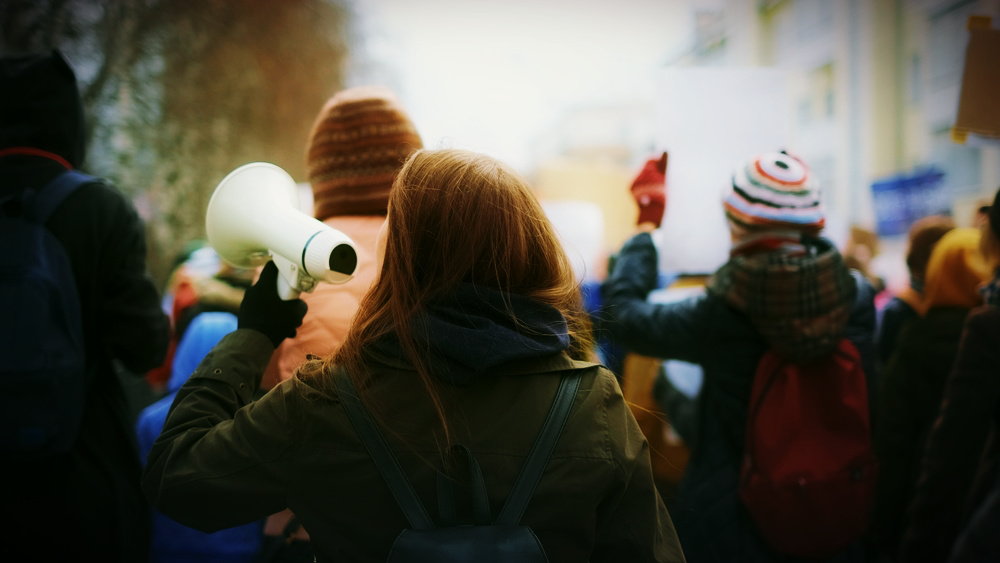Restoring Sanity: Challenging Educational Hegemony in the Struggle for Justice and Peace – While Remembering Columbus
The domination of global hegemonic education, especially at the university level, continues to prevent peace on earth. I focus here on the complicity of Western universities, led by United States cultural hegemony, in allowing for the ongoing horror in Gaza and the prospect of creating an insane Orwellian world, one that disregards “the 7th generation.” I refer to and put this last phrase in quotation marks because I write this piece from an Indigenous worldview orientation that emphasizes peace, oneness, truthfulness, spirit, reciprocity, and a responsibility to follow the laws of Nature for the sake of all generations of life. Such a perspective might bring awareness to the historical insanity of colonization perpetrated against Indigenous Peoples that have ignored prospects for life on Mother Earth.

Am I inferring that the Palestinians are indigenous (small “i) to Israel and the occupied lands in Palestine? I am, although I recognize that it is likely that both the Palestinians and the Jews were indigenous to this land. In any case, the powers that forcibly removed Palestinians in ways the state of Israel and the United States are now doing in Gaza. Both are responsible for genocide and ecocide in Gaza that is happening. Of course, the U.S. did this before to the Indigenous cultures we call American Indians, which is another reason for bringing forth and keeping the hegemony against Indigenous Peoples in mind.
John Nassivera also sees a connection between such colonization and violence. He is a retired professor who retains affiliation with Columbia University’s Society of Fellows in the Humanities. Although he emphasizes the more recent context of the horrible occupation and control of Gaza since 1967, a history seldom Western professors too often ignore or misrepresent, he writes that it might not be a coincidence that Hamas attacked Israel on Columbus Day in 2004. I don’t know if this is true or not, but I agree with Nassivera’s conclusion: “Let us remember that, in the Holy Land (holy to three religions), Jews, Christians, and Muslims lived together in peace for almost 1,000 years, until 1946. For the whole world’s sake, this has to happen again. That must be everyone’s most important mandate.”
I admit that i did not think of Israel as a colonizing force in Palestine, even as Director of Education at Oglala Lakota College. When, in 1999 the University of Tel Aviv invited me to keynote the 2nd Annual Militarism in Education Conference I just assumed they wanted to hear about traditional Indigenous histories and approaches to peace. I was surprised when I learned that the conference was taking a stand against the state of Israel for its hegemonic encouragement of very young students to become soldiers who would become complicit in the colonization actions.
After being on the scene when innocent Jewish passengers were on a bus blown up by a 15 year-old Palestinian girl, the conference mourned but were steadfast about the state’s policies contributing to such a desperate act. After the conference, I had to see for myself what the presenters were describing. I made my way into the West Bank and Gaza’s border. I witnessed more than I needed to realize how terrible Israel treated the Palestinian people. The parallels with the horrible treatment of American Indians were clear.
I recently gave more details about this time in Palestine in a book that just came out “Confronting Antisemitism on Campus.” Of the 32 chapters in the book, mine was the only one that addressed “false accusations of anti-semitism” on college campuses and how they are silencing authentic dialogue and truth. It took an exceptionally long time for the book to come out and I have speculated that it related to my chapter. In any case, there can be no doubt that higher education’s colonialistic hegemony is now in full swing. The New York Times indirectly noted it with an article about college crackdowns on pro-Palestinian activism. Several stories have emerged this year about professors dismissed or disciplined for speaking the truth about what is happening in Gaza, truths recognized by such institutions as the AAUP and the UN Human Rights Counsel.
If university punishments and the silence of university leaders are not bad enough, self-censorship is also problematic. One study shows over 90 percent of professors at all ranks and of students are self-censoring themselves for fear of retaliation. There are notable exceptions, such as revealed in an open letter from IU Academics for Justice in Palestine. Mark A. Ashwill wrote a piece for University World News about why international educators need to end their silence on Gaza. He points to fear, opening with a quote from Cornel West saying, “There is a price to pay for speaking the truth. There is a bigger price for living a lie.” There are also Israeli soldiers speaking out about the propaganda.
How sad it all is. There can be little doubt everyone is suffering. Anti-semitism is higher and is anti-Muslim sentiment. Everyone is losing. But for those concerned, as we all should be about antisemitism, this letter from a Jewish professor and colleague who lives in Israel, one who wishes to remain anonymous, is revealing:
“I hate my country right now. I am against this war and I think the only person who needs it is Netanyahu. He is destroying Israel, its economy, our relations with people and nations outside Israel, our agriculture, our law system, our institutions, and the inner relations between our people. We stand hopeless against him and the legal situation that holds him in the government. Meanwhile, antisemitism is getting higher every day.”

I opened this piece by saying it comes from an Indigenous worldview orientation. Although I do not believe in coincidences, only the intervention of vibrational energies I call spirits, the question remains as to whether Hamas attacked Israel on October 7th because it was Columbus Day. Whether or not diverse Indigenous individuals see what is happening in Gaza as being what happened to their culture, like one group of Navajos and another Indigenous group calling for an end to genocide worldwide, drawing parallels between the Israel-Palestine conflict and the historical violence against American Indians involves understanding both situations within the framework of colonialism, dispossession, and the struggle for self-determination. Here’s an argument outlining some of the parallels:
- Colonial Context: Both situations involve colonial powers (Israel and the United States) exerting control over indigenous populations (Palestinians and American Indians) and their lands. In both cases, colonial settlers arrived in already inhabited territories, leading to conflicts over land, resources, and sovereignty.
- Dispossession and Land Theft: Historically, both Palestinians and American Indians have experienced significant land dispossession and displacement from their ancestral territories. Through processes such as forced removals, land seizures, and discriminatory policies, indigenous peoples have been marginalized and deprived of their lands, often leading to social, economic, and cultural disruption.
- Violence and Resistance: Both Palestinians and American Indians have faced violence and oppression in their struggles against colonial rule. This includes military occupation, state-sponsored violence, and systemic discrimination. Additionally, both populations have engaged in various forms of resistance, including armed struggle, protests, and advocacy for their rights and self-determination.
- Legal and Political Challenges: Both indigenous peoples have encountered legal and political obstacles in their efforts to reclaim their rights and territories. This includes challenges related to recognition of sovereignty, access to justice, and international support. Despite international condemnation of human rights violations, efforts to address these issues through diplomacy and legal means have often been stymied by political interests and power dynamics.
- Humanitarian Concerns: Both conflicts have resulted in significant humanitarian crises, including displacement, poverty, and loss of life. Civilians, including women and children, have borne the brunt of violence and insecurity, facing barriers to necessities such as food, water, healthcare, and education.
- Legacy of Trauma and Injustice: Both the Israel-Palestine conflict and the history of colonization in the Americas have left deep scars on indigenous communities, with intergenerational trauma, loss of cultural heritage, and ongoing struggles for justice and reconciliation.
By recognizing these parallels, we can better understand the complexities of both situations and work towards promoting social/ecological justice, human rights, and peace for all. Without challenging educational hegemony, however, and without calling out university leaders, we may be heading in the opposite direction for such understanding.


